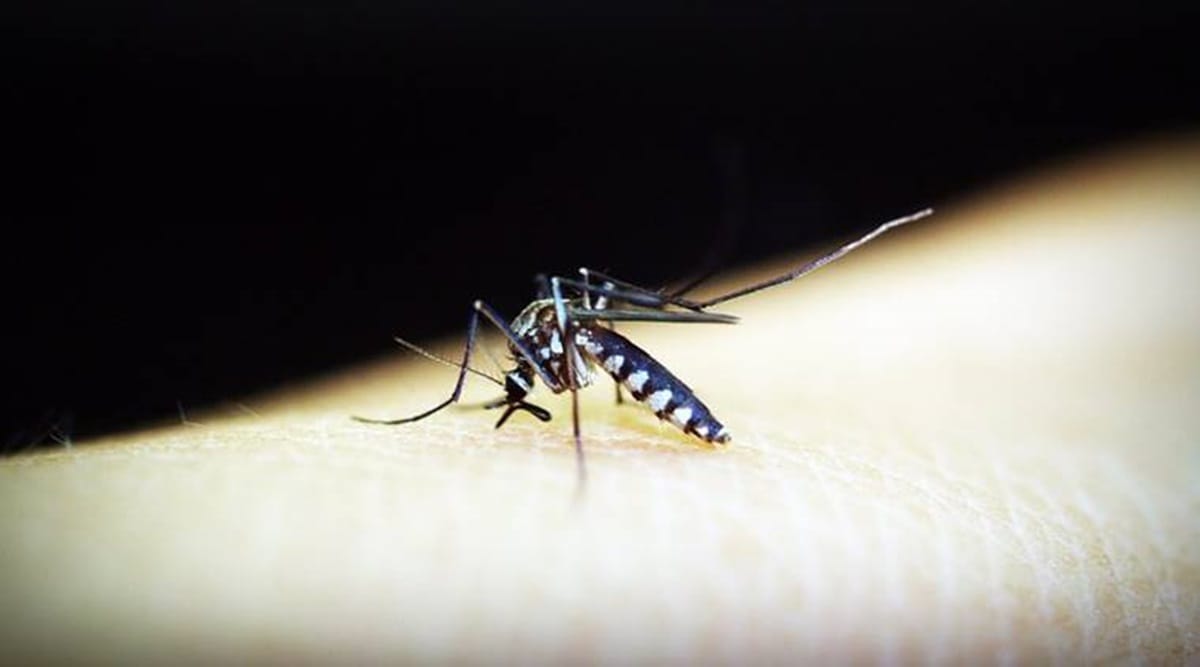 Zika virus (ZIKV), a vector-borne flavivirus transmitted by the bite of infected aedes mosquitoes, mainly aedes aegypti and aedes albopictus. (File Photo)
Zika virus (ZIKV), a vector-borne flavivirus transmitted by the bite of infected aedes mosquitoes, mainly aedes aegypti and aedes albopictus. (File Photo)A new study of the Indian Council of Medical Research (ICMR) has indicated the spread of the Zika virus to several states of India and calls for an urgent need to strengthen its surveillance. Researchers have said in the report that the retrospective surveillance for ZIKV demonstrates the silent spread of this virus to almost all parts of India with a predominance of the more recent 2018 Rajasthan ZIKV strain.
Zika virus (ZIKV), a vector-borne flavivirus transmitted by the bite of infected aedes mosquitoes, mainly aedes aegypti and aedes albopictus. Dr Nivedita Gupta, Head, Division of Epidemiology and Communicable Diseases, when contacted, told The Indian Express that outbreaks of Zika had been reported from Kerala, Uttar Pradesh and Maharashtra during the second wave of Covid pandemic in 2021. “We wanted to determine the presence of the virus from different geographical regions and hence researchers from the National Institute of Virology Pune and other ICMR institutes screened clinical samples of 1,475 patients from May-Oct 2021 and re-tested them for dengue, Chikungunya and Zika,” Dr Gupta said.
The positivity observed for Zika stood at 67, Dengue at 121 and Chikungunya at 10 among the screened cases. The co-infections of Dengue/Chikungunya, Dengue/Zika and Dengue/Chikungunya/Zika were also observed. All Zika cases were symptomatic with fever (84%) and rash (78%) as major presenting symptoms. Of them, four patients had respiratory distress, one presented with seizures, and one with suspected microcephaly at birth. The Asian Lineage of Zika and all four serotypes of Dengue were found in circulation as per the study `Zika a Vector Borne Disease Detected in Newer States of India Amidst the COVID-19 Pandemic’ published in June this year in Frontiers in Microbiology journal.
“Our results indicated the need for continuous and enhanced surveillance for ZIKV along with DENV and CHIKV with emphasis on the ante-natal ZIKV screening. It is also critical to strengthen linkages of ZIKV surveillance sites with the existing newborn birth defect screening sites in the country to understand the spectrum of ZVD in babies born to ZIKV infected mothers,” the researchers said.
Best of Express Premium
The report has described the results of this retrospective analysis, which revealed the circulation of ZIKV in Delhi, Jharkhand, Rajasthan, Punjab and Telangana states of India in 2021 in addition to Kerala, Maharashtra, and Uttar Pradesh. Co-infection of Zika and dengue and chikungunya were another concern in many places.
The ZIKV positive samples detected during retrospective testing at ICMR-NIV, Pune revealed the presence of ZIKV in Amritsar, Punjab (1/120); New Delhi (1/64); Aligarh, UP (2/288); Jodhpur, Rajasthan (1/120); Ranchi, Jharkhand (1/120); Hyderabad, Telangana (1/60), and Thiruvananthapuram, Kerala (60/120), during 2021. Among the 67 ZIKV positive cases, 13.43% were hospitalised while 86.56% (58) of the cases were managed on an outpatient basis.
Here it may be recalled that India initiated a sentinel surveillance of Zika Virus Disease in March 2016 through its network of virus research and diagnostic laboratories (VRDLs) by the ICMR across the country. The sentinel ZIKV surveillance was initiated with 10 laboratories in 2016, the VRDLs were up-scaled to 56 in 2018 and 132 by 2021. The trained VRDLs were advised to test at least 10 dengue virus (DENV) and chikungunya virus (CHIKV) negative samples for ZIKV, throughout the year.
Through this surveillance, sporadic cases were first picked up in the state of Gujarat (2016−2017) and Tamil Nadu (2017). Following this, outbreaks of ZIKV were detected in Rajasthan and Madhya Pradesh in 2018. After 2020, the public health surveillance of ZIKV could not be continued with the same vigor due to the involvement of all VRDLs in Covid-19 diagnostics considering the subsequent waves of the pandemic. All these VRDLs were advised to store the DENV/CHIKV negative samples for ZIKV testing in the future, Dr Gupta said.
- The Indian Express website has been rated GREEN for its credibility and trustworthiness by Newsguard, a global service that rates news sources for their journalistic standards.

